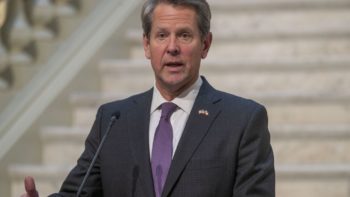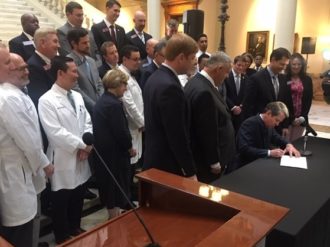The timing of the waiver decision, right before Christmas, drew a quick, angry response from state Republican leaders.
Gov. Brian Kemp’s spokeswoman noted that the federal health officials’ announced rejection of the state’s proposed work requirements for its Medicaid waiver came two days before Christmas. “They attempted to hide behind the holiday,’’ said Katie Byrd.
Georgia House Speaker David Ralston said President Biden acted “like the Grinch’’ in taking away the chance of thousands to gain Medicaid coverage through the waiver.

The U.S. Centers for Medicare and Medicaid Services (CMS) actually accepted the waiver concept of increasing Medicaid enrollment, but denied the state’s request to impose eligibility requirements on recipients, such as 80 hours of work, training or volunteer hours each month to retain their coverage.
Regardless of timing, the decision by the Democratic presidential administration was not a surprise. The White House had already rejected other states’ efforts to base Medicaid eligibility on working a minimum amount of time.
“We are disappointed the Biden administration chose to turn its back on a bipartisan group in the Georgia General Assembly that came together to help create a fair and balanced health care framework that increases options and lowers costs,’’ Byrd said in a Christmas Eve statement. “We plan to challenge their misguided — likely political — decision in a court of law.”
The Kemp response could include pursuing such a court challenge, or just letting the waiver idea die.
If the plan went forward under the feds’ outline, it would add an estimated 237,000 more Georgians to Medicaid than the 50,000 the Kemp plan had projected, the Georgia Budget and Policy Institute said.
That price tag would be much higher than for standard Medicaid expansion, which would cover more people, said Laura Colbert of the consumer advocacy group Georgians for a Healthy Future. Georgia is one of 12 states that have not expanded Medicaid under provisions of the Affordable Care Act.

According to the Budget and Policy Institute, the cost per person for fully expanding Medicaid is five times lower than Georgia’s approved partial expansions, as the federal government would pay 90 percent rather than 67 percent for partial expansion.
Democratic state Rep. Sam Park of Lawrenceville said on Twitter of GOP criticism of the CMS action: “What’s shameful is blaming Biden and others for @GaRepublicans ongoing failure and refusal to expand Medicaid.”
But Kemp, facing a Republican primary challenge from former U.S. Sen. David Perdue, isn’t expected to move toward expansion, especially before the nomination vote.
A wild card in the Medicaid expansion debate is the health insurance provisions in the Build Back Better bill being considered in Congress. As currently written, it would provide a work-around for the federal government to provide coverage in the health insurance exchange to all poor adults in the states that have not expanded Medicaid.
Passage of that federal bill is far from certain, but if it were law it could take some political steam out of the Medicaid expansion issue during Georgia’s election season.

CMS Administrator Chiquita Brooks-LaSure, in her letter to the head of the Georgia Department of Community Health, cited the Covid-19 pandemic’s devastating impact.
“Considering the physical, mental, social and economic toll the public health emergency has taken on individuals, CMS believes it is especially important that the low-income individuals who are the intended beneficiaries of the Georgia Pathways to Coverage demonstration be able to access coverage and care, without the initial and continued eligibility obstacle of a work requirement that may be unreasonably difficult or impossible for individuals to meet under the circumstances of COVID-19 and its likely aftermath,’’ she wrote.

